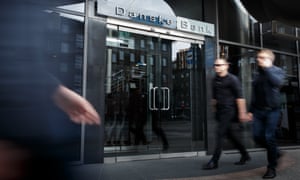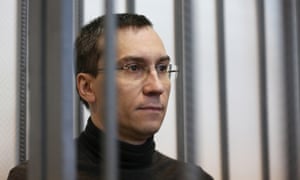Russia
Global Laundromat
Denmark’s biggest bank believes cash was funnelled through British companies by people linked to Vladimir Putin’s family and the FSB spy agency

The Estonian branch of Denmark’s Danske bank.
Photograph: Andras Kralla/Äripäev
A Danish bank accused of money laundering shut down Russian accounts after concluding that they were being used to funnel cash through British companies by members of Vladimir Putin’s family and the FSB spy agency, according to leaked reports.
Danske, Denmark’s biggest bank, closed 20 Russian customer accounts in 2013 following a whistleblower report alleging that its Estonian branch was involved in suspicious and possibly illegal activity.
Last September it emerged that the same branch was at the centre of a secret lobbying operation in which some $2.9bn (£2.2bn) of mostly Azerbaijani money was channelled through opaque British companies.
The latest revelations concern a different group of firms, most registered in London. In summer 2013 Danske bank employees discovered that one of these UK entities, Lantana Trade LLP, had filed “false accounts” to Companies House.
According to the whistleblower report, Lantana told Companies House that it was “dormant”, with only a very limited financial turnover. In fact, Lantana held large deposits and made daily transactions of millions of euros. Lantana’s Danske account – opened in late 2012 – functioned for 11 months.
The ultimate owners of Lantana, and related limited partnerships, were Russians. But their identities were hidden behind a series of offshore management firms based in the Marshall Islands and the Seychelles.
The whistleblower report was obtained by the Danish newspaper Berlingske, and shared with the Guardian and the Organised Crime and Corruption Reporting Project (OCRRP). It said the bank had failed to establish who was behind Lantana, adding that “apparently it was discovered that they included the Putin family and the FSB”.
Details were sent to Estonia’s financial intelligence unit and passed to Danske’s top management. Danske only began a full inquiry in 2017. It did not inform either the UK or Companies House.
Danske said on Monday: “We have launched a thorough investigation to get to the bottom of the events at that time in our Estonian branch.” It refused to comment on “specific customers” but said it had “closed down” the “entire portfolio in question” featuring “non-resident” Russians.
The revelations again highlight the use of the lightly regulated British corporate landscape to move large sums of money around, beyond the purview of regulators and tax authorities. In this case the beneficiaries appear to have been figures with Kremlin connections.
Baltic countries are a major entry point into the western financial system for Russian cash. Last week the US Treasury accused Latvia’s third biggest bank of “institutionalised money laundering”. Days later the country’s central bank chief, Ilmārs Rimšēvičs , was arrested following allegations he took a €100,000-plus bribe (paywall).
Rimšēvičs has denied all allegations and has denounced them as a smear campaign.
Danske’s Estonian managers grew concerned following a tip-off from inside Russia. They found that Lantana was closely linked to Promsberbank, a little-known bank in Podolsk, outside Moscow. Promsberbank’s senior managers represented Lantana.
One member of Promsberbank’s board was Igor Putin, the cousin of Russia’s president. A major shareholder was Alexander Grigoriev, a banker who, according to the Organised Crime and Corruption Reporting Project (OCCRP), has FSB ties. Another was Alexei Kulikov, who was arrested in 2016 and charged with “large-scale fraud”. Promsberbank collapsed in 2016 when it emerged that 3bn roubles (about £38m) had disappeared.

One former Danske employee said the bank’s internal investigation revealed “high-ranking employees” from Promsberbank were behind Lantana. The employee told Berlingske newspaper: “The company and cash flows were controlled by the bank. It wasn’t just rumours. This is valid information.”
The trio were closely connected with another scandal featuring Germany’s Deutsche Bank. Deutsche has admitted that between 2011 and 2015 its Moscow division ran a $10bn (£7bn) “mirror trades” scheme. The scheme allowed VIP Russian clients to transform roubles into dollars, via related corporate entities that “bought” and “sold” identical volumes of stock.
Quick guide
How is money laundered out of Russia?

Billions of dollars are believed to be laundered around the world each year. But the public rarely gets an insight as to how. Three leaks in the past year have provided a glimpse into how money from former Soviet republics has been laundered, often via companies incorporated in the UK.
Between autumn 2010 and spring 2014 Russian officials and insiders moved billions of dollars into Europe, the US and other countries. Law enforcement officers in Moldova and Latvia have tracked down at least $20bn in dirty money.
Ingeniously. Shell companies, most registered in the UK, loaned each other money in fictitious deals and when the loans were not repaid, Russian guarantors would transfer real money out to make good on the deal. In this instance, money moved via Moldova and Latvia.
A second operation, betrayed by a data leak from Danske bank in Estonia, showed almost $3bn of Azerbaijani money funnelling through the bank between 2012 and 2014. The cash was routed through four UK-incorporated companies.
Same Estonian bank, more Russian suspects, more UK-incorporated companies to clean the money, similar volumes of cash. According to a whistleblower at the Danish bank, Russian bankers moved millions through an opaque network of offshore vehicles. The same Russians, and the same London companies, were linked to yet another laundering operation in which some $10bn was siphoned out of Russia via dubious Deutsche Bank trades.
Kulikov had a Danske account. Several of the entities closed down by Danske in 2013 were involved in Deutsche Bank mirror trading, including Chadborg Trade LLP, based in Potters Bar in Hertfordshire, Cherryfield Management and Financial Bridge. Deutsche Bank – the main lender to Donald Trump – paid $630m in US-UK fines for laundering Russian cash.
Danske’s decision to investigative went down badly in Moscow, where Lantana had a city centre office. A Danske account manager flew to the Russian capital to obtain documents revealing Lantana’s real owners. He left a meeting shaken, reporting that his Russian clients were “furious”, bank sources say.
A few weeks later a meeting was held at Danske’s office in the Estonian capital, Tallinn. Two Russians refused to identify themselves and allegedly told bank staff: “Do you really feel you can walk home safely at night?” They added: “The bank will sink after this.” These threats were reported internally.
L Burke Files, an international financial investigator, said the fact that the same entities were used in different schemes “does not surprise me one bit”. Professional criminals “design or craft” a package to get round compliance checks and then “use it at every bank”, he said.
He described the Lantana case as “very serious”, adding: “The activity in the account was in every way indicative of money laundering. There were many large transactions and all of them done in one or two days. The money didn’t linger. Here is a small branch of a very big bank that has an account moving tens of millions every day.”
The scale of the fraud is unknown. According to Files it could have been between $2.2bn and $3.3bn in total, based on a pattern of $10m-plus being laundered every day.
He added: “This is such an excellent way to move large sums of money that I am sure is still occurring. It is a very difficult trail to follow.”
Grigoriev allegedly masterminded another big league money-laundering scheme dubbed the Global Laundromat. Between 2010 and 2015 at least $20bn was moved out of Moscow into western banks. The money went via Moldova and Latvia. Igor Putin sat on the board of a bank involved in the fraud, the Russian Land Bank or RZB.
Putin declined to comment. In a letter written in 2014, he said: “My personal experience, gained in recent years, proves the truth of the thesis that the Russian banking system should be radically rehabilitated and cleaned of troubled banks headed by people with doubtful reputations.”
Grigoriev and Kulikov are currently in jail. Grigoriev was arrested in 2015, a year after RZB was shut for money-laundering offences. Kulikov was imprisoned in a different matter. In April 2015 Russia’s central bank revoked Promsberbank’s licence. So far Kulikov has not replied to a letter sent to him in prison inviting comment.
The British companies involved in the scam were wound up. Lantana was dissolved in December 2015.
The damning whistleblower report said that Danske had suffered a “near total process failure”. It did not identify Lantana’s true owners or take action over “suspicious payments made just under compliance control limits”. The bank “breached numerous regulatory requirements”, “behaved unethically” and “may have committed a criminal offence”, it said.
Robert Endersby, Danske’s British chief risk officer at the time, who saw the report, declined to comment. Danske said it now had a “very different and stronger control set up in Estonia”. It admitted it should have acted “faster”.
Madis Reimand, the head of Estonia’s financial intelligence unit, would not comment directly on the Lantana group of companies.
He said: “Generally speaking the purpose of such money-laundering schemes is to move funds out of Russia, to get the money into the western financial system, and to do it in a non-transparent and secretive manner.”